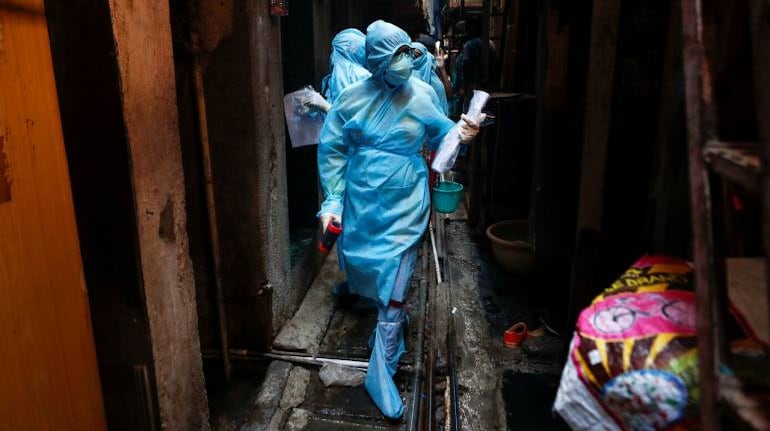



Dr Pankaj Ashiya, a medical doctor and an Indian Administrative Service (IAS) officer, has been pressed into service at a hospital specially set up to deal with coronavirus patients in Malegaon, in Nashik district, which is fast emerging as a hotspot in Maharashtra. Ashiya has been given special powers to take criminal action against both patients violating the curfew norms and health workers abdicating their duty. Nashik District Collector Suraj Mandhare hopes that Ashiya will combine his medical knowledge with his administrative skills to battle COVID-19.
In Maharashtra, as in many other states, the infected people have been quarantined either at home or at special quarantine centres, and migrant workers, the homeless, and destitute have been lodged in government shelters. The lockdown has been enforced to the extent possible, and to mitigate inconvenience caused by this in some places, for example, even ambulances have been pressed into service to deliver medicines. Markets have been regulated to observe social distancing norms and direct sale from farmers to the consumer is in the works.
A crisis of this magnitude is a challenge for the best of administrators. That is why the success in this fight squarely lies on the administrative acumen of each state. A supportive political establishment is also necessary, but to a great part its role is in enabling the bureaucracy to work freely. The lack of political leadership in many states and cities across India is proving to be an impediment, but where it exists, as in Maharashtra, officers are doing their best to follow the rules and have them followed.
That said, there are some exceptions as well. Amitabh Gupta, principal secretary for home in Maharashtra, disregarded the norms of the lockdown and issued passes for friends and members of the Wadhawan family to travel from Mumbai to Lonavla and later Mahabaleshwar. The DHFL promoters Kapil Wadhawan and Dheeraj Wadhawan — facing charges in the Yes Bank case — refused to appear before the Enforcement Directorate in March citing health risk arising from COVID-19. The Central Bureau of Investigation (CBI) was on the lookout for them but it turns out Gupta, who described them as family friends, knew where they were holed up. Not surprisingly, Gupta has been sent on compulsory leave pending investigation with Home Minister Anil Deshmukh stating he will not be spared if found guilty.
Apart from a few, by and large bureaucrats are handling the crisis well. Mumbai Commissioner Pravin Pardesi is an officer who has handled many a disaster to the satisfaction of chief ministers across the board. NCP chief Sharad Pawar entrusted him with major rehabilitation work during the 1993 Latur earthquake. Pardesi was former Chief Minister Vilasrao Desumukh’s trusted man in Kutch when Maharashtra undertook rehabilitation of some villages in neighbouring Gujarat after the 2001 earthquake.
Under Pardesi, Mumbai has been testing far more patients than other cities, which could also be a reason why the figures are so high in the state. When it comes to Mumbai, the population and — more importantly — the population density must not be overlooked. This is what makes the task of controlling the outbreak in Mumbai a challenging one. Perhaps now would be a good time to act on previous suggestions and divide the metropolis into smaller administrative zones to make them more manageable.
While the bureaucracy is largely focused on fighting the pandemic, the Bharatiya Janata Party (BJP), which is the principal opposition, appears to be focusing on destabilising the government. While Gupta’s actions have caused an uneasiness between the government and the bureaucracy, some highlight the fact that Gupta, along with Pardesi and Chief Secretary Ajoy Mehta were officers handpicked by Devendra Fadnavis when he was Chief Minister.
However, Anil Deshmukh is letting no grass grow under his feet. He was swift to act against those, including reporters who spread fake news, who incited migrant workers to gather in large numbers at Bandra station on April 14. He has been equally swift in arresting 110 people, including nine minors, and suspending two police officers after three men, including two sadhus, were killed by a mob at Palghar, in Thane district, on April 16. Some were quick to give both incidents a communal colour, but the culprits in Bandra case were identified as from the majority community and in the second case as adivasis who thought the saffron-clad men were child-lifters posing as sadhus.
There seems to be a sentiment against leaders who are trying to gain political capital while we are all facing an unprecedented crisis. BJP leaders, such as Sudhir Mungantiwar, have complained that their attempts to have live chats with their followers on Facebook was interrupted by ‘gangs’ on social media.
While the truth in that needs to be unearthed, for now it seems the bureaucracy has a tough job at hand. The bureaucracy across India is under severe stress and hopefully it will deliver us out of this pandemic.
Sujata Anandan is a senior journalist and author. Views are personal.
Discover the latest Business News, Sensex, and Nifty updates. Obtain Personal Finance insights, tax queries, and expert opinions on Moneycontrol or download the Moneycontrol App to stay updated!
Find the best of Al News in one place, specially curated for you every weekend.
Stay on top of the latest tech trends and biggest startup news.